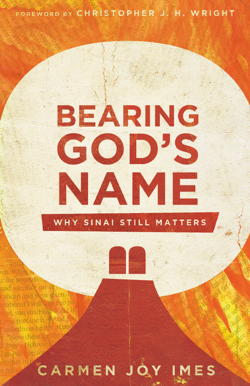Pull up a chair and join us as we chat with biblical scholar and professor Carmen Joy Imes about her latest book, Bearing God's Name: Why Sinai Still Matters, which launched December 10, 2019.

What led you to write this book?
While working on my dissertation, I had a growing sense of urgency to put what I was learning in the hands of people who are not biblical scholars. My dissertation had to be technical, but the concepts I was studying are essential for Christians to understand. I'm so grateful that InterVarsity Press gave me the opportunity to share it with the world.
What do you love about the Old Testament?
The Old Testament is the epic story of God's relentless pursuit of his people and his determination to bless all nations through them. If we read it carefully and contextually, we find grace on every page. I'm passionate about helping people discover the riches of the Old Testament and its indispensability for understanding Jesus and his mission.
Do you have suggestions for advent readings from the Old Testament?
Yes, lots! I've developed an advent resource that is freely available on my blog. Some of my favorite passages for advent are Isaiah 53, 58, 60, and 61.
Context Is Everything
excerpt from Bearing God's Name: Why Sinai Still Matters by Carmen Joy Imes
The first and most commonly made mistake with the Old Testament law is to ignore where it appears. Many Christians assume that in the Old Testament era the Israelites had to earn salvation by following the Sinai law, while Jesus did away with that notion, making salvation available for free. This is a terribly unfortunate caricature of the Old Testament, but it is easily resolved by taking a closer look at the story. Israel arrives at Sinai in chapter 19 of Exodus. That’s where Yahweh will give them the law. However, God’s elaborate deliverance of the Israelites from Egypt takes place in chapters 3–14. If the law were a prerequisite for salvation, then we would expect to see Moses in Egypt making a public service announcement: Hey, everyone — Good news! Yahweh plans to set you free from slavery to Pharaoh. There’s just one catch. You’re gonna have to agree to live by this set of rules. If you just sign on the dotted line saying that you agree to these conditions, Yahweh will spring into action. Who’s in?
Of course, this is not what happens. Instead, God appears to Moses in the wilderness, reveals his personal name, Yahweh, and gives Moses this message for those living under oppression in Egypt:
The Lord, the God of your fathers — the God of Abraham, Isaac and Jacob — appeared to me and said:
I have watched over you and have seen what has been done to you in Egypt. And I have promised to bring you up out of your misery in Egypt into the land of the Canaanites, Hittites, Amorites, Perizzites, Hivites and Jebusites — a land flowing with milk and honey. (Exodus 3:16‑17)
Yahweh delivers them “with an outstretched arm and with mighty acts of judgment” (Exodus 6:6) without first checking their homes for idols or performing an audit of their morality. His deliverance has to do with his character and his promise to their ancestor, Abraham, rather than with their righteousness. True, God had given instructions to Abraham and his sons, which they were to obey, but he had not given them any permanent code of conduct.
God made a covenant with Abraham back in Genesis. He promised as many descendants as the stars in the sky (Genesis 15:5), along with a vast tract of land that would become theirs (Genesis 15:18‑21). He also
had spoken of Israel’s future enslavement in Egypt:
Know for certain that for four hundred years your descendants will be strangers in a country not their own and that they will be enslaved and mistreated there. But I will punish the nation they serve as slaves, and afterward they will come out with great possessions. (Genesis 15:13‑14)
Now they’ve done their time. Yahweh is ready to put his plan in motion. Abraham’s descendants have become a great multitude (see Exodus 1:7), and they’re about to be rescued. The only requirement is for each family to eat a lamb together and spread its blood on their door frame as a sign for God to protect them from the destroying angel.
Whatever Sinai represents, it cannot be a prerequisite for salvation. Israel has already been delivered when they arrive. In order to understand what the law at Sinai is for, we’ll need to take seriously where and when it is given and how it is framed. And timing is everything.
Taken from
Bearing God’s Name by Carmen Joy Imes. Copyright (c) 2019 by Carmen Joy Imes. Published by InterVarsity Press, Downers Grove, IL.
www.ivpress.com